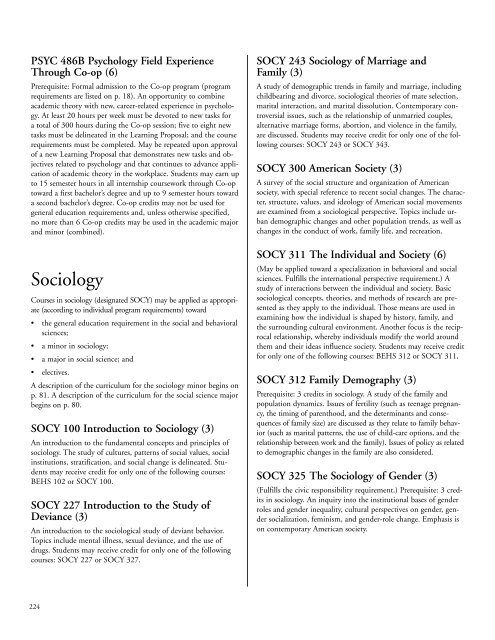1a. IntroSUS 2003 - University of Maryland University College
1a. IntroSUS 2003 - University of Maryland University College
1a. IntroSUS 2003 - University of Maryland University College
- No tags were found...
Create successful ePaper yourself
Turn your PDF publications into a flip-book with our unique Google optimized e-Paper software.
PSYC 486B Psychology Field ExperienceThrough Co-op (6)Prerequisite: Formal admission to the Co-op program (programrequirements are listed on p. 18). An opportunity to combineacademic theory with new, career-related experience in psychology.At least 20 hours per week must be devoted to new tasks fora total <strong>of</strong> 300 hours during the Co-op session; five to eight newtasks must be delineated in the Learning Proposal; and the courserequirements must be completed. May be repeated upon approval<strong>of</strong> a new Learning Proposal that demonstrates new tasks and objectivesrelated to psychology and that continues to advance application<strong>of</strong> academic theory in the workplace. Students may earn upto 15 semester hours in all internship coursework through Co-optoward a first bachelor’s degree and up to 9 semester hours towarda second bachelor’s degree. Co-op credits may not be used forgeneral education requirements and, unless otherwise specified,no more than 6 Co-op credits may be used in the academic majorand minor (combined).SociologyCourses in sociology (designated SOCY) may be applied as appropriate(according to individual program requirements) toward• the general education requirement in the social and behavioralsciences;• a minor in sociology;• a major in social science; and• electives.A description <strong>of</strong> the curriculum for the sociology minor begins onp. 81. A description <strong>of</strong> the curriculum for the social science majorbegins on p. 80.SOCY 100 Introduction to Sociology (3)An introduction to the fundamental concepts and principles <strong>of</strong>sociology. The study <strong>of</strong> cultures, patterns <strong>of</strong> social values, socialinstitutions, stratification, and social change is delineated. Studentsmay receive credit for only one <strong>of</strong> the following courses:BEHS 102 or SOCY 100.SOCY 227 Introduction to the Study <strong>of</strong>Deviance (3)An introduction to the sociological study <strong>of</strong> deviant behavior.Topics include mental illness, sexual deviance, and the use <strong>of</strong>drugs. Students may receive credit for only one <strong>of</strong> the followingcourses: SOCY 227 or SOCY 327.SOCY 243 Sociology <strong>of</strong> Marriage andFamily (3)A study <strong>of</strong> demographic trends in family and marriage, includingchildbearing and divorce, sociological theories <strong>of</strong> mate selection,marital interaction, and marital dissolution. Contemporary controversialissues, such as the relationship <strong>of</strong> unmarried couples,alternative marriage forms, abortion, and violence in the family,are discussed. Students may receive credit for only one <strong>of</strong> the followingcourses: SOCY 243 or SOCY 343.SOCY 300 American Society (3)A survey <strong>of</strong> the social structure and organization <strong>of</strong> Americansociety, with special reference to recent social changes. The character,structure, values, and ideology <strong>of</strong> American social movementsare examined from a sociological perspective. Topics include urbandemographic changes and other population trends, as well aschanges in the conduct <strong>of</strong> work, family life, and recreation.SOCY 311 The Individual and Society (6)(May be applied toward a specialization in behavioral and socialsciences. Fulfills the international perspective requirement.) Astudy <strong>of</strong> interactions between the individual and society. Basicsociological concepts, theories, and methods <strong>of</strong> research are presentedas they apply to the individual. Those means are used inexamining how the individual is shaped by history, family, andthe surrounding cultural environment. Another focus is the reciprocalrelationship, whereby individuals modify the world aroundthem and their ideas influence society. Students may receive creditfor only one <strong>of</strong> the following courses: BEHS 312 or SOCY 311.SOCY 312 Family Demography (3)Prerequisite: 3 credits in sociology. A study <strong>of</strong> the family andpopulation dynamics. Issues <strong>of</strong> fertility (such as teenage pregnancy,the timing <strong>of</strong> parenthood, and the determinants and consequences<strong>of</strong> family size) are discussed as they relate to family behavior(such as marital patterns, the use <strong>of</strong> child-care options, and therelationship between work and the family). Issues <strong>of</strong> policy as relatedto demographic changes in the family are also considered.SOCY 325 The Sociology <strong>of</strong> Gender (3)(Fulfills the civic responsibility requirement.) Prerequisite: 3 creditsin sociology. An inquiry into the institutional bases <strong>of</strong> genderroles and gender inequality, cultural perspectives on gender, gendersocialization, feminism, and gender-role change. Emphasis ison contemporary American society.224

















